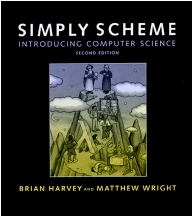
| Brian
Harvey University of California, Berkeley |
| Matthew
Wright University of California, Santa Barbara |
| Download PDF version |
| Back to Table of Contents |
| BACK chapter thread NEXT |
| MIT Press web page for Simply Scheme |

|
|
Write a procedure number-name that takes a positive integer
argument and returns a sentence containing that number spelled out in words:
> (number-name 5513345) (FIVE MILLION FIVE HUNDRED THIRTEEN THOUSAND THREE HUNDRED FORTY FIVE) > (number-name (factorial 20)) (TWO QUINTILLION FOUR HUNDRED THIRTY TWO QUADRILLION NINE HUNDRED TWO TRILLION EIGHT BILLION ONE HUNDRED SEVENTY SIX MILLION SIX HUNDRED FORTY THOUSAND)
There are some special cases you will need to consider:
| • | Numbers in which some particular digit is zero |
|---|
| • | Numbers like 1,000,529 in which an entire group of three digits is zero. |
|---|
| • | Numbers in the teens. |
|---|
Here are two hints. First, split the number into groups of three digits, going from right to left. Also, use the sentence
'(thousand million billion trillion quadrillion quintillion sextillion septillion octillion nonillion decillion)
You can write this bottom-up or top-down. To work bottom-up, pick a subtask
and get that working before you tackle the overall structure of the
problem. For example, write a procedure that returns the word FIFTEEN
given the argument 15.
To work top-down, start by writing number-name, freely assuming the
existence of whatever helper procedures you like. You can begin debugging
by writing stub procedures that fit into the overall program but
don't really do their job correctly. For example, as an intermediate stage
you might end up with a program that works like this:
> (number-name 1428425) ;; intermediate version (1 MILLION 428 THOUSAND 425)
Brian Harvey,
bh@cs.berkeley.edu